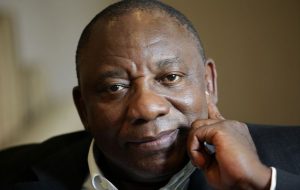


South Africa’s President, Cyril Ramaphosa says he will account for his actions as a senior official under former precedent Jacob Zuma
Cyril Ramaphosa, the president of South Africa, has said he will appear before a judicial anti-corruption inquiry to account for his actions as a senior official during what he described as a “very dark period of our recent history”.
Ramaphosa took power in February, three months after winning a close-run internal party election, but has struggled to overcome the legacy of his predecessor, Jacob Zuma.
Zuma has been accused of presiding over an immense system of corruption and patronage that drained billions from the exchequer and damaged the reputation of the ruling African National Congress (ANC) beyond repair. Ramaphosa served as deputy president under Zuma.
Speaking to a small group of reporters in Johannesburg on Thursday Ramaphosa spoke of a “new dawn” for South Africa and for the ANC, which has been in power since the country’s first free elections in 1994.
“There is a new confidence, a new hope in the ANC. The shine that had been tarnished is coming back,” the 65-year-old tycoon and veteran politician said.
However Ramaphosa admitted there were concerns about his years serving under Zuma.
“The question has been raised: ‘You were there, you were deputy president, and many of these things were happening under your nose. Did you know?’,” said Ramaphosa, who has never been accused of any personal wrongdoing. “In time I guess I am going to be required to appear before the [inquiry] to answer certain things … So I will be going to give an account myself of what I knew, what I didn’t know and all that.”
Hearings of the judicial inquiry into the accusations – set up earlier this year on the orders of the powerful public anti-graft watchdog – have already led to revelations that have deeply embarrassed senior officials, and forced the resignation of the respected finance minister.
On Thursday Ramaphosa sacked Tom Moyane, the head of the tax collection agency and Zuma ally, on the recommendation of the judicial inquiry. In a letter to Moyane, Ramaphosa said the investigation had painted “a deeply concerning picture of the current state of [tax revenue authority] SARS and the reckless mismanagement which characterised your tenure”.
Ramaphosa said the judicial inquiry was working in an organised way to “shed light” and “when the moment comes the criminal justice system will kick into action”.
A former trade unionist who was one of the leaders of the struggle against apartheid in the 1980s, Ramaphosa spoke to journalists after addressing a business leadership summit and a conference on gender-based violence.
The South African premier, who appeared tired but determined, faces challenges on every front. The economy is weak, expectations are high and his broadly centrist market-orientated policies face strong opposition from within his own party.
Entrenched networks of government and ANC officials loyal to Zuma are still powerful, while international investors, though interested by South Africa’s undoubted potential, remain wary.
The economy is in recession. Unemployment – already very high – is rising and inflation is hitting poor people’s budgets hard.
Twenty-four years after the end of the racist, repressive apartheid regime, South Africa remains a country with enormous resources and great wealth but also vast inequality.
Much of the focus in recent months has been on the possible redistribution of farmland – largely owned by white people, who constitute less than 10% of the population. Late last year the ANC committed to more effective measures to redistribute land.
This, and a decision to press ahead with a constitutional amendment to allow expropriation without compensation has rattled investors, as well as prompting Donald Trump to tweet an unfounded rightwing claim that white farms were being seized by the government and farmers suffering “large-scale killing”.
Ramaphosa said he had sat next to Trump at a lunch on a recent visit to the US but the issue had not been raised. Instead the two leaders had spoken about golf, with Trump quizzing his counterpart on South African golf champions.
“We exchanged pleasantries … He spoke about [his] golf courses, so that is land, I guess,” Ramaphosa said.
The ANC faces a difficult election next year, which could see its share of the vote dip below 50% for the first time. The leftwing faction within the party, and the populist opposition Economic Freedom Fighters, have pushed for more radical measures to redistribute resources.
The president said he was confident the party would win an “overwhelming victory” in the polls, though admitted it had lost ground in recent years and that party officials continued to commit “misdemeanours” .
“We went through a real period of decline …because many people felt we had departed from our value system but there is a new mood in the country, much as it is tempered by the economic conditions we are going through. We need to do more,” he said.
Though successive ANC governments have made huge efforts to build homes and supply basic services to millions of people, they have been unable to meet expectations. Many people still live without electricity or sanitation. Schooling and healthcare are often rudimentary. One recent survey found eight out of 10 nine-year-olds in South Africa are functionally illiterate.Levels of violent crime are among the highest in the world, with poor South Africans suffering most. – theguardian.com